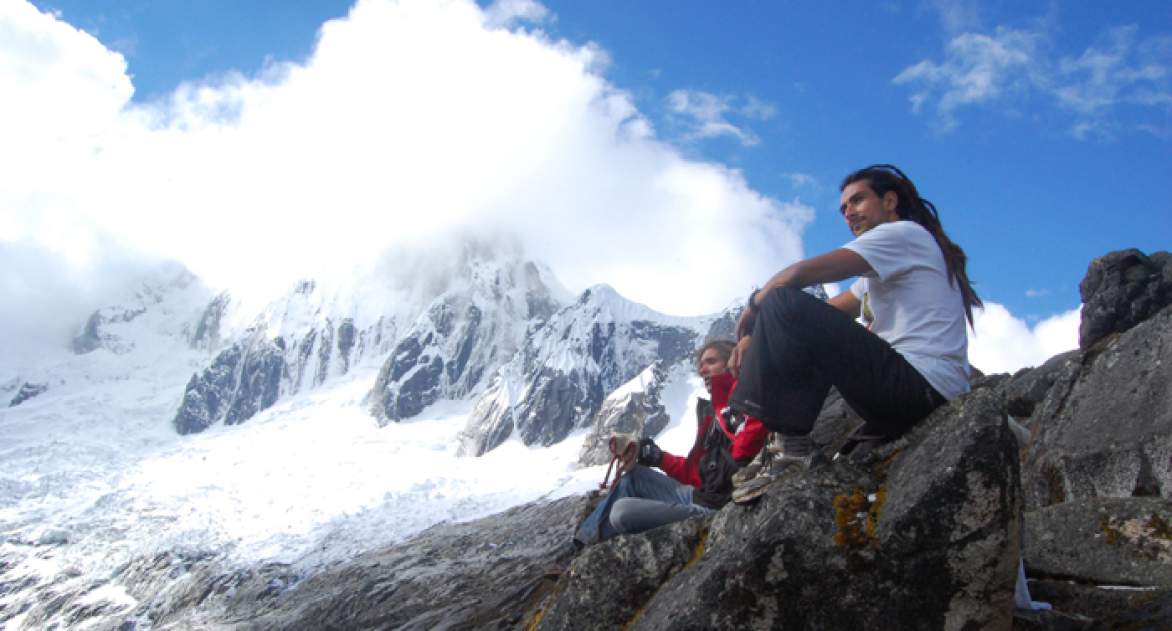Summertime is vacation time, a welcome respite from routine that takes different shapes for different people. It might be a quiet escape to nature, an action–packed adventure in a far-flung country, an annual pilgrimage to reconnect with family or a sedate week at home to sleep in, chill out and chip away at the to-do list.
However you spend your holiday, the point is that it's not in the office, factory or lab. We talked to several MagLab scientists and engineers about their vacations and how they complemented, balanced or inspired their work.
Their destinations varied, from their own backyard to the peaks of Peru. Some found they couldn't escape science even if they tried. Others found the sensory thrill of new foods, scenery and sounds provided a sorely needed counter balance to a cerebral life.
But in every case, new experiences and scenery inspired fresh ideas and energy. Which makes us wonder: How do your vacations inspire you in science? Whether you are scientist or a science buff, tell us where you go or what you do to recharge your passion for science using #scication on Facebook, Twitter or Instagram.
Mixing science with pleasure
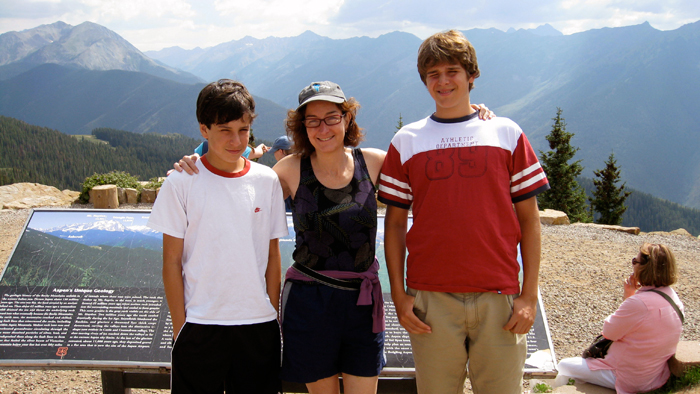
Laura Greene with sons Leo (left) and Max in Aspen.
Who: Laura Greene
Where: Colorado
Laura Greene can't seem to get enough of physics: She's president-elect of the American Physical Society, conducts research on high-temperature superconductivity, and is chief scientist at the National MagLab. So it's no surprise she's spending the one precious week of summer vacation she is allowing herself at the Aspen Center for Physics in Colorado.
Greene insists it's not all work: With the Rocky Mountains as their backdrop, scientists also go for long walks and enjoy cookouts.
"You're in this beautiful area, it's just absolutely gorgeous," explained Greene, a repeat visitor to the center. "People do a lot of hiking. You get all sweaty and talk to each other: We do talk about other things, but the majority of the conversations are about physics."
Not exactly a break from science. But it is a break from the day-to-day stresses of the lab and office — something that a younger Greene never allowed herself.
"Before I had kids, I always worked until I dropped," she said.
Her two young sons, however, forced the issue — and taught her the scientific upside of downtime.
"Some of my girlfriends and I, we've admitted to each other we've done our best work since we've had children," said Greene. "Somehow, by getting a little bit of a break and thinking of something else, your brain keeps working on [scientific problems] and it helps you be more creative."
Time for the mind to wander
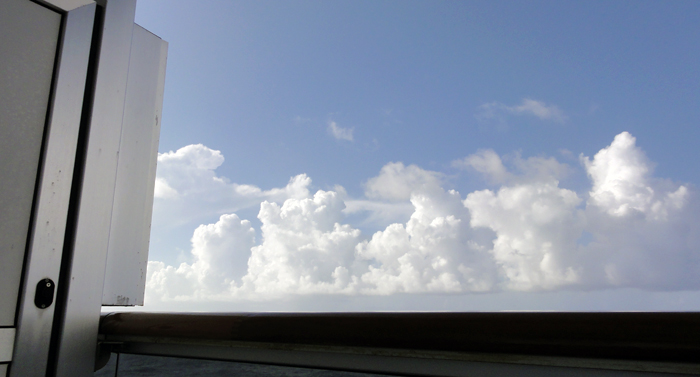
John Kynoch observed these clouds during his Caribbean cruise.
Who: John Kynoch
Where: Middle of the Atlantic Ocean
A few years ago, MagLab Facilities Director John Kynoch and his family took a cruise to Puerto Rico. En route to San Juan, in the middle of the awe-inspiring Atlantic Ocean, Kynoch stole some alone time (his wife and three kids were at the pool) to admire the view from the deck.
There in the sun and wind, Kynoch watched the show of clouds forming over the water, swelling taller and taller as more water vapor rose from the sea. It occurred to him that vacations, by liberating you from the clutter, calendars and concerns of daily life, free your mind to observe what is happening around you.
Kynoch is a mechanical engineer, not a meteorologist. But his engineer's curiosity about how things work, combined with the peace and quiet of the middle of the ocean, prompted him to ask questions about temperature, pressure, evaporation and thermodynamics.
On vacation, you're not weighed down by petty worries, said Kynoch. "You see the birds or the trees or plants," he said, "and also you have more time where you're just sitting around. And you think, ‘Well, why is this like that? Why is the tide doing this today, or why are the clouds flattening out at the top?' You have more time for your mind to wander and think about things."
Green thumb holiday
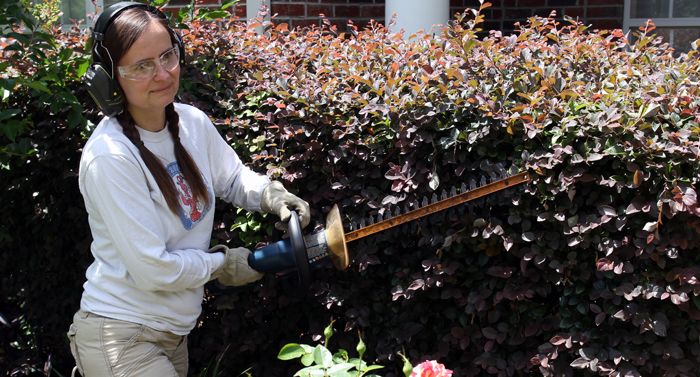
Bianca Trociewitz at work in her yard.
Who: Bianca Trociewitz
Where: Her backyard
Mention the word "vacation" to MagLab research engineer Bianca Trociewitz and you will get a stunned look.
Between her busy schedule in the lab's Electron Magnetic Resonance (EMR) Facility, where she designs and modifies magnet probes and supports visiting scientists, and her husband, Ulf's, research at the lab's Applied Superconductivity Center (ASC), vacations are a rarity.
There's also the fact that Trociewitz is missing the relaxation gene. So when she does take time off, it's for a "staycation" at the couple's two-acre home south of Tallahassee. Pedicures and Netflix — definitely not on the agenda.
What is on the agenda? Trociewitz elaborates:
"I just focus on weeding, mowing, edging, pruning, cutting down trees, torching or spraying weeds, burning pruned branches, planting new trees, seeding something, watering plants, fertilizing plants, inspection of diseases and pests and, of course, harvesting and preparation of the harvested fruits or vegetables."
"It certainly clears my mind," she added.
With her passion for landscaping and gardening, Trociewitz has no need to travel to exotic locales for a change of scenery. She changes the scenery herself almost every day, planting and tending her loquats, figs, peaches, mulberries, hazelnuts, pecans and citrus trees — just to name a few of her botanical babies.
It's pretty sweaty work under the Florida sun and humidity. But she's her own boss and she clocks in and out as she pleases. It's a welcome change from lab work and allows her absolute control.
"You make the decision when something needs to be done," she said
In the role of farmer and botanist, Trociewitz can't forgo science entirely: Research, observation, trial and error, and record keeping are all important to her success at the lab and in her garden.
"Not everything brings a result," she explained. "So you apply one chemical to a plant to kill something. If you see nothing has happened, then you move to the next product. The same with science."
Trociewitz's backyard handiwork is as much art as science. Motorists hit the brakes as they drive by her property, admiring the thematic "islands" she has created — one featuring different grasses, another reminiscent of Madagascar, yet another through which a miniature train chugs on its miniature track. There are little bridges to cross and inviting benches.
Not that Trociewitz, brown hair pulled back in pony or pig tails, ever stops to actually use one.
"I've created all these lovely, little spots that I can sit on, but I never sit," she said. "I'm like a bumble bee … or, better, like an ant, because I'm always moving in every corner."
Avocation vacation
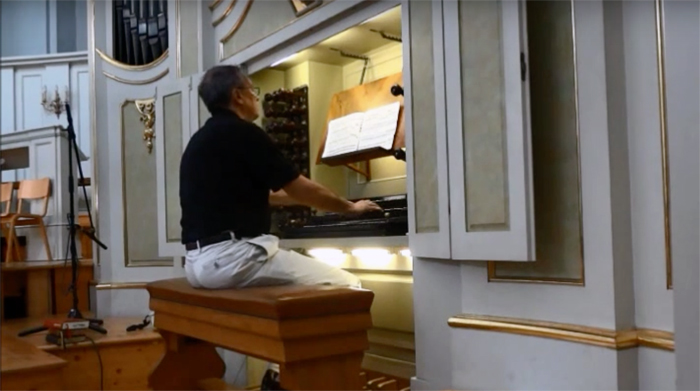
Jurek Krzystek plays the Dresden Cathedral organ.
Who: : Jurek Krzystek
Where: Dresden, Germany
When it's time for a break from the MagLab's EMR Facility, physicist Jurek Krzystek often escapes to Europe. A native of Warsaw, Poland, he especially favors Italy, where he and his wife spent two weeks this spring touring archeological sites of Campania and Sicily, immersing in a different culture, language and landscapes, and enjoying great food and wine.
"I don't have to think about science for two weeks," said Krzystek. "It frees my mind from current worries."
When describing how such getaways benefit his vocation, Krzystek plucks from his brain the versatile Italian verb divertire, which can mean to entertain, to distract, or to pull one's thoughts from a troubling topic.
But some of Krzystek's trips are designed as much to indulge his avocation as to temporarily divert him from his vocation.
For the past decade, Krzystek has been an avid organ player, finding in this art a balance to his science. He practices weekly on a beautiful Taylor and Boody organ in Tallahassee's First Presbyterian Church, but his passion has him pining for more historic instruments. So when he plans vacations, destinations offering proximity to famous historic organs are a big plus.
"Wherever I can find access, I try to play," he said.
Last year, when Krzystek was scheduled for a professional leave, he decided to spend it in Dresden, Germany. That the 18th-century Dresden Cathedral is home to a world-famous Gottfried Silbermann 1755 organ and that the surrounding area abounds with other historic instruments were not trivial considerations. After some effort (and finding the right connections), the physicist finally convinced the organ's caretakers to allow him to play the Dresden instrument.
On the appointed day, Krzystek turned up at the door of the cathedral with the sheet music of his favorite J. S. Bach compositions. Ushered in by the music director, he was left alone with the Silbermann organ for an hour and a half.
"The sound of Bach's greatest masterpieces reverberating through the magnificent historic church, with myself being in full control of that sound, and the realization that I was playing an instrument built by the composer's professional partner and colleague made this experience truly exhilarating," said Krzystek.
His time at the organ console was an intense sensory experience that flushed every other thought from his mind. (Watch and hear him play on YouTube.)
"After that I went to the airport to pick up my wife, who was flying into Dresden," recalled Krzystek, "and she said later that I was so euphoric that I just couldn't come down."
Why are such breaks so important for work?
"It's about the same as sleep," said Krzystek. "Why do we sleep? Nobody understands why, but our organism needs it. In this case, I needed some distraction, or let's call it in Italian: divertimento."
Balancing knowledge with experience
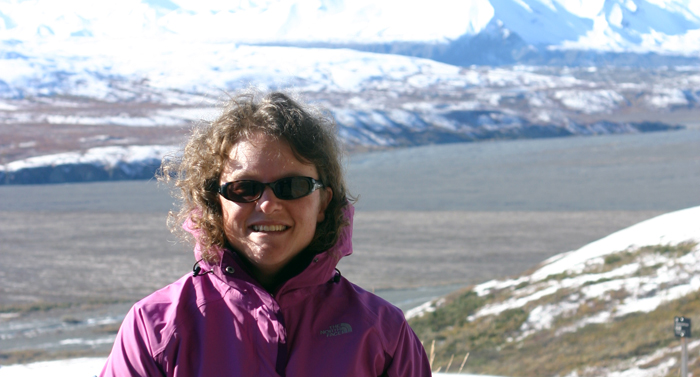
Christianne Beekman in front of Denali, the highest peak in North America.
Who: Christianne Beekman
Where: Alaska
By the time Christianne Beekman, then a postdoc at Oak Ridge National Laboratory ventured to Alaska a few years ago while, she had been reading about science for quite some time.
But studying books about natural phenomena like aurora borealis and actually watching colors dance in the air above her on a frigid night near Fairbanks were two very different things, she learned.
Different, but complementary.
"Reading is rational and scientific. But the experience of it is not scientific at all," said Beekman, now a physicist at the MagLab. "Maybe it's just a different side of your brain that you're using. It's a different way of experiencing the same thing."
Getting to know something through your senses, in other words, enhances the facts and formulas about it stored in your brain. That's one reason vacations are so valuable.
Take hot springs, for example. Beekman's brain knew before her Alaska trip that hot springs can be the result of volcanic activity, and that the pungent odor often associated with them was hydrogen sulfide in the water.
"At some level we analyze what we encounter," she said, "and I think that just comes with the nature of being a scientist."
But lowering one's weary body into those hot springs after a long day of hiking and soaking in their warmth on a nippy September Alaska afternoon — well, that was another matter entirely. Joining fact with experience is to understand the thing more fully.
Beekman still talks animatedly about the wildlife she witnessed in the Land of the Midnight Sun: grizzlies, birds of prey, mountain goats, a momma moose with her calf. New sights, smell and sounds, she said, get the cerebral juices flowing — which can only serve to help a scientist.
"I think taking a short break here and there is very important," said Beekman, who will spend a few weeks in her native Holland this summer. "And if you can then fill that with beautiful things like a trip, seeing art or natural phenomena or wildlife — just something that you can't find in your office or in your lab — I think that sparks creativity, even if you don't know that at the time.
"Coming back," she added, "you're rested, you have seen many different things, you can tackle that tough problem."
Starstruck by science
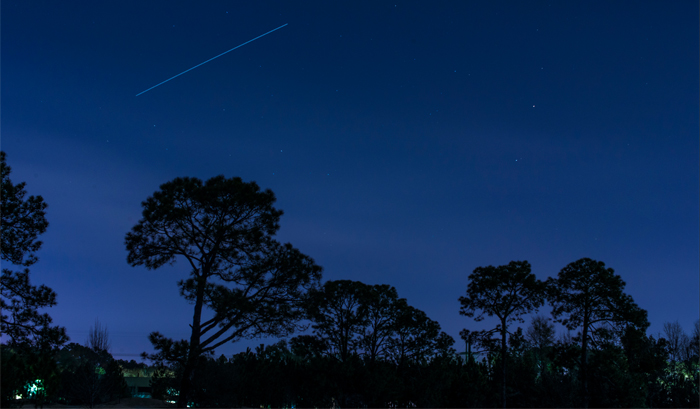
International Space Station passing above Tallahassee. Image by Charlie Sanabria under Creative Commons Attribution-ShareAlike 4.0 International License.
Who: Charlie Sanabria
Where: The night sky
When Charlie Sanabria stares up at the night sky, he doesn't see stars. He sees stories.
He sees the stories of fellow scientists — Newton, Kepler, Galileo — who centuries ago asked the same questions that he asks today when he studies superconductors. "Why is this here?" "Why does this move in this direction and not in the other?" "Why that way and not this way?"
Sanabria, a graduate research assistant at the ASC, feels this cosmic connection so profoundly that he schedules vacations around the phases of the moon — the better to peer at the stars, and into the past.
"My new obsession is trying to get the best Milky Way photo I can," said Sanabria. Having trekked in Peru and Colorado, he is planning a trip to the Grand Canyon this summer.
About two years ago, Sanabria started to read stories about science history that he had never learned in school. He was riveted by the fears, obsessions and misgivings of the men and women behind famous theories, laws and equations. Reading about Isaac Newton, Sanabria saw page by page the legend transform into a flesh-and-blood man who, for all his genius, struggled with the same mistakes and anxieties as most of the rest of us.
"The history behind this guy is so much more interesting than the laws themselves," said Sanabria. "His story resonates with me so much more than an equation that I see on a piece of paper."
That's what Sanabria thinks about when he travels with his telescope, staring at stars and planets that inquiring minds such as his have contemplated for ages.
"The same sky that we're looking at today has not changed very much from the time when Newton was looking at it," said Sanabria. "That's pretty fascinating."
Well, there have been a few changes, and several months back Sanabria dragged his girlfriend out one night to see one. He had recently found a website that noted exactly when and where the International Space Station would appear in the night sky. Not sharing Sanabria's passion for astronomy, his girlfriend waited impatiently.
Then, precisely when and where the site had predicted, the space station materialized in the heavens. They watched it for a minute as it blinked its way through star-studded blackness.
"At that point," said Sanabria, "even my girlfriend just stood up and looked at it and said, ‘That's pretty cool.'"
The outing was a testament to the power of getting off the couch and into the world to explore, whether for a weeks-long vacation or a nocturnal adventure.
"I think we need more situations like that," said Sanabria, "where the average person is exposed to something fascinating to where it triggers their curiosity about science and exploration."



